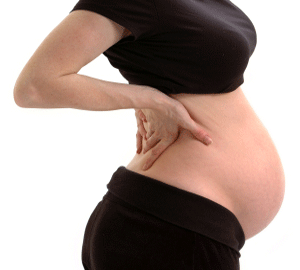The majority of musculoskeletal problems that arise during pregnancy can be prevented and treated with physiotherapy. Individualised physical therapy programs have been found to be more effective than group sessions for the reduction of pain and sick leave caused by back pain in pregnancy. Individualised session’s should include exercise therapy, postural training/advice, and ergonomics recommended once weekly over a 5 week period.
The 2003 joint statement of the Society of Obstetrician and and Gynaecologists (SOGC) and the Canadian Society of Exercise Physiology (CSEP) regarding exercise during pregnancy recommended resistance exercise in addition to aerobic exercise for pregnant women. “Women and their care providers should consider the risks of not participating in exercise activities during pregnancy, including loss of muscular and cardiovascular fitness, excessive maternal weight gain, higher risk of gestational diabetes or pregnancy-induced hypertension, development of varicose veins and deep vein thrombosis, a higher incidence of physical complaints such as dyspnea or low back pain and poor psychological adjustment to the physical changes of pregnancy.” (Wolfe et al 2003).

Pregnancy related problems that benefit with physiotherapy & exercises
The most common are musculoskeletal problems like back & pelvic girdle pain (approx. 50% prevalence in pregnancy [Britt et al 2004], thoracic pain and nerve compression syndromes (e.g. carpal tunnel, ulnar nerve neuritis, de Quervain’s tenosynovitis).
Pelvic girdle pain and back pain
According to Artal et al (2008) most of the musculoskeletal problems that pregnant women experience are related to the altered postures. Whilst it may not be possible to stop this process from occuring, it is possible to minimise these maladaptive postures. With posture advice and strengthening of the core muscles, the weakened structural integrity can be somewhat restored. This helps reduce or eliminate many of the common discomforts associated with pregnancy and improve postpartum recovery, particularly those associated with back problems (Artat et al 2008, Hammer et al 2000).
Nerve pathologies
Exercises to mobilise the nerves within nervous system can also be advised for women with nerve compression.
How does the doctor assess whether physiotherapy suits me?
Our doctor who specialise in back pain issues associated with pregnancy can recommend exercises for pregnant and post-partum women after an assessment which generally consists of an analysis of the following:
- Joint mobility and symmetry
- Muscle imbalances and strengths
- Neurological evaluation
- Evaluation of functional limitations
- Pain management
- Techniques to aid joint and soft tissue flexibility
- Recommendations for sleeping and resting positions
- Posture correction and ergonomic advice
- Postpartum rehabilitation
